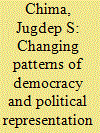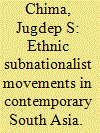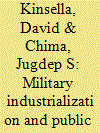|
|
|
Sort Order |
|
|
|
Items / Page
|
|
|
|
|
|
|
| Srl | Item |
| 1 |
ID:
188376


|
|
|
|
|
| Summary/Abstract |
This article contributes to answering the fundamental research question, “Why do individuals participate in contentious ethnonationalist movements?” More specifically, it tries to ascertain which competing theory of human behavior—rational-chooser, socially-embedded actor, or instinctive psychological being—best explains this phenomenon. Based on over a dozen in-depth interviews with Sikh ethnonationalists from Punjab-India, this paper finds that social constructivism, and to a much lesser extent, the sociopsychological paradigm best explain why individuals join collective ethnonationalist movements. In contrast, the rational-choice theory finds only very limited support. Even when sociopsychological and rational-choice motivations are found for individual participation in risky ethnonationalist movements, they exist either intertwined or in close conjunction with social constructivist ones, thus giving even increased support for this dominant theory.
|
|
|
|
|
|
|
|
|
|
|
|
|
|
|
|
| 2 |
ID:
021444


|
|
|
|
|
| Publication |
Jan-Feb 2002.
|
| Description |
19-39
|
|
|
|
|
|
|
|
|
|
|
|
|
|
|
|
| 3 |
ID:
113199


|
|
|
|
|
| Publication |
2012.
|
| Summary/Abstract |
India is the second most populous country in the world with over 1.2 billion people, and the world's "largest democracy." It is home to a bewildering number of different ethnic, religious, linguistic, caste, and cultural groups whose community boundaries are difficult to define because of both cross-cutting cleavages and overarching identities. Hindi is the country's official language of government, English has the status of "subsidiary official language," and over a dozen other languages have been officially recognized; Indian dialects number in the hundreds.
|
|
|
|
|
|
|
|
|
|
|
|
|
|
|
|
| 4 |
ID:
082139


|
|
|
|
|
| Publication |
2007.
|
| Summary/Abstract |
This article examines the 'political' and 'military' strategies used by the Indian state successfully to quell the Sikh insurgency in Punjab, and applies these lessons to controlling the Sunni insurgency in Iraq. At a conceptual level, this article argues that insurgencies are both a 'military' and 'political' phenomenon, and that ways to quell them can be either 'military' or 'political,' or a combination thereof. At the empirical level, this article argues that stability cannot be restored to Iraq until Sunni political actors are effectively brought into the mainstream political process through either 'military' or 'political' means, or a combination thereof. The analysis in this article provides substantive depth and detail to these otherwise seemingly straightforward propositions.
|
|
|
|
|
|
|
|
|
|
|
|
|
|
|
|
| 5 |
ID:
093183


|
|
|
| 6 |
ID:
143939


|
|
|
|
|
| Summary/Abstract |
This article analyzes the continuing interethnic and anti-state violence in Assam, India after the creation of the semi-autonomous Bodoland Territorial Area District (BTAD) in 2003. We argue that this institutional arrangement, as an “innovative” model of ethnofederalism and political autonomy, has been unsuccessful in effectively preventing continued violence. We identify several dynamics resulting from the creation of the BTAD that contribute to its ineffectiveness, including the emergence of parochial and militarized Bodo ruling cliques, competitive radicalization between Bodo political elites competing in insular electoral constituencies, the inability to co-opt and integrate factionalized Bodo militants, reinvigorated non-Bodo activism and communalism, and the increased politicization of land. The extreme and multi-faceted “ethnic” diversity found in India’s Northeast, and its aggressive political expression at the local level, differentiates this region from other parts of India where ethnofederalism has been comparatively more successful for conflict mitigation. Thus, the prospects for successful ethnofederalism are area-specific.
|
|
|
|
|
|
|
|
|
|
|
|
|
|
|
|
| 7 |
ID:
020073


|
|
|
|
|
| Publication |
July 2001.
|
| Description |
353-373
|
|
|
|
|
|
|
|
|
|
|
|
|
|
|
|
|
|
|
|
|